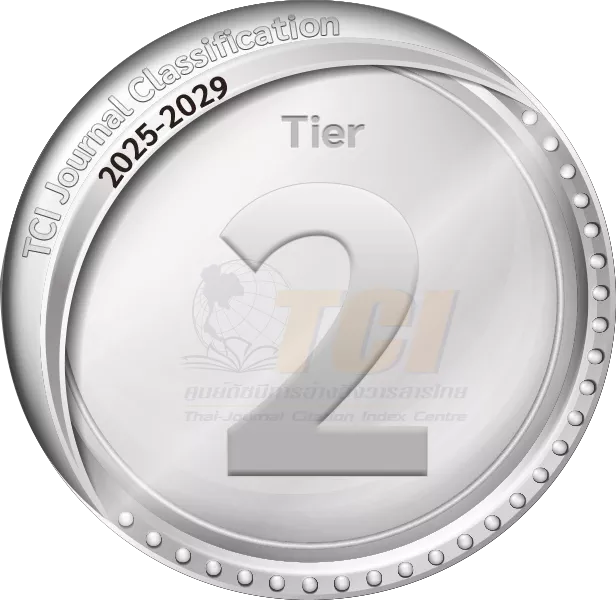Mindfulness-Based Practices for Multicultural Meditation Practitioners to Develop Mental Well-Being
DOI:
https://doi.org/10.14456/abacodijournal.2025.13Keywords:
Activities, Loving-Kindness, Meditation, Mental Well-Being, Mindfulness, Multicultural Practitioners, PracticeAbstract
This research investigates mindfulness-based practices for enhancing the mental well-being of multicultural meditation practitioners. The study is conducted in three phases with the following objectives: 1) To study the mental well-being circumstances and analyze the problems of multicultural meditation practitioners, 2) To develop the process of mindfulness-based practice for the mental well-being of multicultural meditation practitioners, and 3) To evaluate the process of mindfulness-based practice for the mental well-being of multicultural meditation practitioners. A mixed-methods approach was employed, combining qualitative research with quantitative pre- and post-test assessments and in-depth interviews. The research was conducted at Wat Thai Buddharam in Brisbane, Australia. The study involved 30 participants who were selected through purposive sampling. These individuals represent a wide range of cultural backgrounds, including various religions, languages, and ethnicities. The findings reveal that multicultural meditation practitioners face various psychological challenges, including stress, anger, and mental distress, despite their good health and financial security. The study developed a culturally sensitive mindfulness-based intervention, resulting in the "Mindfulness Wisdom and Loving-kindness" (MWL) program. This program, designed to enhance mental health and inner peace in multicultural settings, emphasizes inclusivity and diverse activities. The evaluation, using questionnaires and interviews, demonstrated significant improvements in participants' mental health, confirming the benefits of mindfulness practices tailored to diverse cultural backgrounds.
References
Australian Bureau of Statistics. (2022). Cultural diversity in Australia.
https://www.abs.gov.au/articles/cultural-diversity-australia.
Australian Bureau of Statistics. (2023). Regional Population. https://www.abs.gov.au/statistics /people/population/regional-population/latest-release.
Balci, S., Küchler, A., Ebert, D. D., & Baumeister, H. (2024). Culturally adapted Turkish version of an internet-based mindfulness intervention for university students: a randomized controlled feasibility trial. BMC Digital Health, 2(1).
Blignault, I., Saab, H., Woodland, L., & O’Callaghan, C. (2021). Cultivating mindfulness: evaluation of a community-based mindfulness program for Arabic-speaking women in Australia. Current Psychology, 42(10), 8232-8243.
Blignault, I., Saab, H., Youssef, H., Baddah, H., Giourgas, K., & Woodland, L. (2023). “It is definitely a good program for everyone from every community”: A qualitative study of community partner perspectives on the Culturally and Linguistically Diverse (CALD) Mindfulness Program. International Journal of Environmental Research and Public Health, 20(16), 6608.
Cavanna, A. E., Purpura, G., Riva, A., Nacinovich, R., & Seri, S. (2023). The Western origins of mindfulness therapy in ancient Rome. Neurological sciences: official journal of the Italian Neurological Society and of the Italian Society of Clinical Neurophysiology, 44(6), 1861-1869. https://doi.org/10.1007/s10072-023-06651-w
Gargiulo, M. T. (2023). The role of religion and spirituality in mindfulness practices: A qualitative literature review. Smaratungga: Journal of Education And Buddhist Studies, 3(1), 1-12.
Gasimova, N. (2024). Multiculturalism as the main philosophical doctrine of political and cultural development of modern society. Metafizika Journal, 7(2), 79-89.
Grant, C. A. (2018). Together for a better multicultural society. Multicultural Perspectives, 20(4), 200-201. https://doi.org/10.1080/15210960.2018.1527148
Iyus Yosep, I., Mardhiyah, A., & Sriati, A. (2023). Mindfulness intervention for improving psychological wellbeing among students during covid-19 pandemic: A scoping review. Journal of Multidisciplinary Healthcare, 16, 1425-1437.
Jiwattanasuk, N. (2021). A Process of Development for Peaceful Well-Being of Meditation Practitioners through Buddhist Peaceful Means: A Case Study of Buddhamahametta Foundation, Chiang Rak Noi, Phra Nakhon Si Ayutthaya [Doctoral dissertation]. Mahachulalongkornrajavidyalaya University.
Jiwattanasuk, N., Premasakul, K., Tanpoonkiat, W., & Deegalle, M. (2024). Cultivating mindfulness activities to develop peaceful well-being. Journal of International Buddhist Studies, 15(1), 37-54.
Kabat-Zinn, J. (1990). Mindfulness-Based Interventions in Context: Past, Present, and Future. Clinical Psychology: Science and Practice, 10(2), 144-156.
Kabat-Zinn, J. (2005). Full catastrophe living: Using the wisdom of your body and mind to face stress, pain, and illness (15th ed.). Delta Trade Paperback/Bantam Dell.
Liu, Q., Feng, Y., London, K., & Tang, L. (2021). Mental health issues in the culturally diverse construction workplace: A literature review. Proceedings of the 24th International Symposium on Advancement of Construction Management and Real Estate, 2229-2238.
Morales, A., & Burnett-Zeigler, I. (2024). A scoping review of culturally adapted mindfulness-based interventions for communities of color. Journal of Integrative and Complementary Medicine, 31(2). https://doi.org/10.1089/jicm.2023.0807.
Rhys Davids, C. A. F., & Carpenter, J. E. (Eds.). (1966). The Satipaṭṭhāna Sutta (2nd ed.). Pali Text Society.
Rogers, S. (2022). The Mindful Law Student. Edward Elgar Publishing.
Satinsky, E. N., Filippou, T. A., & Kousoulis, A. A. (2019). Multiculturalism and compassion: Responding to mental health needs among refugees and asylum seekers comment on “a crisis of humanitarianism: Refugees at the gates of Europe. International Journal of Health Policy and Management, 8(12), 734-736.
Thomassen, L. (2014). Multiculturalism. The Encyclopedia of Political Thought.
Uygur, S. (2022). A look at intercultural sensitivity from the perspective of mindfulness and acceptance of Diversity. Journal for the Education of Gifted Young Scientists, 10(4), 547-561.
World Health Organization. (2022). Mental disorders. https://www.who.int/news-room/fact-sheets/detail/mental-disorders.



